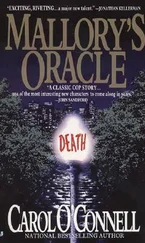“Rock ’n’ roll was the end of boyhood,” wrote Peyton Hale. “The music was wired into my skull, and my toes tapped to rhythms that only I could hear. Dogs were not so quick to come to me just for the pleasure of licking my hand. And the fathers of girls could see me coming from a long ways off. Oh, and the girls, they found me dangerous, and didn’t I love that? My salad days, my outlaw days. The road and the music-just sixteen. And now that I’m an old man of twenty-five, my road is disappearing as I write, as I ride.”
Mallory took the next ramp that would turn her car east. She was heading back toward the grave-digging troopers, though she could not say why. Her debt to Kronewald was surely paid in full. Perhaps it was because April Waylon had come back for another ride, eyes popped wide and searching every bit of road, still so determined to find a lost child.
It might be this one.
The caravan was crossing from Oklahoma into Texas when Riker reached out and turned off the fire and brimstone of a radio evangelist. “Okay, that’s enough local color. Could you talk to Joe Finn when we stop for the night?”
“No point,” said Charles Butler. “He won’t leave the road. Mr. Finn is really no different from the other parents.”
“Oh, he’s different all right.” And Riker had had his fill of wild cards. “Finn’s daughter’s is buried in a Kansas cemetery, and he has to know that’s her body. I’m not buying into this denial crap. I’ve been through this before. It doesn’t last a year-usually just a few minutes. The parents shake their heads at you like you’re crazy. How can their kid be dead? ‘No, you made a mistake, you stupid cop.’ And then they cry. Now this guy, he wouldn’t even look at the corpse. I think Joe Finn wants payback. Probably figures he can find this freak before we do.”
“No, he wouldn’t bring two children on a mission like that.”
“You’re right. That’s nuts.” The detective turned to the passenger window and nursed a theory that fathers of murdered children were not very stable people.
Te n miles of Texas prairie rolled by before Charles broke the silence. “Guilt always comes with a death in the family. Always. People dwell on last days and how they could’ve been different, given a second chance- and, of course, superhuman powers to see into the future. You can’t c u re them with logic. It’s the same when a child goes missing. That’s why these parents can’t leave this road. They’d be consumed by guilt if they didn’t d o everything in their power to bring their children home.”
“Or die trying.”
“I don’t think that enters into the equation. I’m sure you noticed that most of these people are single parents. They’ve lost spouses to divorce, one suicide that I know of. And then there’s alcoholism and depression. I know how you picked out the FBI moles so easily. They were playing the part of a happily married couple.”
“The moles are doing a crummy job of keeping an eye on the kid.”
“Sorry,” said Charles. “Sometimes I forget that Mallory’s not all that communicative. I thought you knew. The moles aren’t watching her at all. The other day, when Dodie disappeared under the table and Peter was screaming her name, the moles turned to look at Magritte. He’s their only concern. It makes sense. I’m sure you suspected that the killer was in the doctor’s therapy group. Murderers sometimes insinuate themselves into-”
“Oh, shit,” said Riker. “That’s why Dale pulled that stunt with Joe Finn. He was painting a target on Dodie. He’s drawing fire away from his best witness-Magritte.”
Witness? Or suspect?
Riker answered his cell phone. It was the moles telling him that they had lost the Pattern Man to an exit ramp, and Dale Berman would not send agents to bring the little man back to the fold. Horace Kayhill was not one of the parents-not their problem.
“So he’s expendable?… Yeah, right … ‘I’m sorry’doesn’t cut it, kid… No, you tell that idiot in charge-” The line was dead.
Damn moles.
Riker placed his next call to Special Agent Berman’s cell phone. “Dale?… Yeah, it’s about Horace Kayhill… No, Dale, you’re gonna send out a posse… Why? Well, if that little guy isn’t o n your shortlist, you’re a moron.” After another few moments of listening, he ended the call and folded his phone into his shirt pocket. “They’re going after him.”
“Nicely played,” said Charles. “I know how much you despise Agent Berman, but you always use his first name-like an old friend.” He raised his eyebrows and shrugged to say, Just curious, not prying.
Dr. Paul Magritte’s Lincoln was following the Mercedes when the old man saw Detective Riker turn around, twisting to reach into the back seat. The doctor eased up on the gas pedal to drop behind by one more car length. He took a last look at the blurry photograph of April Waylon. It had been taken while the woman was still losing blood from her slashed throat. This was the face of ongoing terror-not quite dead. He turned his attention back to the car in front of him. Riker was still facing this way.
Perhaps guilt inspired the flight of fancy, the uneasy feeling that the detective’s line of vision could travel several car lengths, then bend and dip and turn to dark corners. Though Riker could not possibly know what Dr. Magritte held in his hand, the photograph was hastily concealed inside the folded maps on the dashboard.
Riker was so happy to hear Mallory’s voice. Apparently, in a lapse of apathy, she had forgotten to turn off her cell phone.
The grasslands of the Texas Panhandle were sliding by his passenger window while he told her the story of the dead wolf and a foiled plot to kill Dale Berman. A breeze ruffled the papers in his hand as he read her snatches of correspondence between the government and George Hastings. “Dale found the kid’s body, but he won’t release it for burial. So all this time goes by, months and months. Hastings gets tired of begging Dale for Jill’s body. He bypasses Dale’s field office and writes to Washington. Mallory, I got copies of everything. Now, all Hastings got back were form letters, but guess whose office they came from?”
There was silence on the other end. Guessing games annoyed her. He gave her a broad hint. “The Assistant Director of Criminal Investigations.”
“Harry Mars,” said Mallory. “He can’t be running this circus.”
“He’s not, and I’ll tell you how I know. Mars’s office sent a whole slew of these damn form letters. It looks like a stall. I don’t think the FBI knows where Dale stashed the bodies of any of those kids. Interesting, huh? But I know he’s been digging them up for almost a year.”
“All right,” said Mallory. “So we’re looking for a makeshift morgue somewhere in Dale’s comfort zone-near a Texas field office. Not all of the remains are skeletons. He’d want a place with refrigeration. Get the body count from Horace Kayhill’s maps.”
“I can’t,” said Riker. “The Pattern Man defected. I’ve got agents and troopers out looking for the little guy. I even used a news helicopter. No luck. But all this new coverage might scare the freak off till we can find Horace.”
“No,” said Mallory, “the perp is loving this. Imagine the thrill.”
Riker could not, but he deferred to Mallory in all things sociopathic. “Oh, the feds finally ran a check against vehicle registration. One of the parents, Darwinia Sohlo-”
“The name’s a fake,” said Mallory.
The connection went dead, and it would be no use to call her back. His partner’s cell phone worked only one way-at her convenience.
Читать дальше












